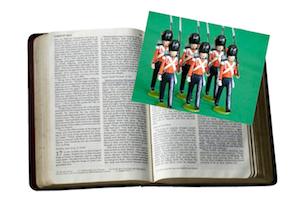 I’m wanting to spend some time this week with a much-repeated phrase: “All that is necessary for the triumph of evil is that good men do nothing.” We hear that phrase time again, used to justify this action or that one. As I pointed out yesterday, everyone assumes that they are the “good men” and their rivals the “evil.”
I’m wanting to spend some time this week with a much-repeated phrase: “All that is necessary for the triumph of evil is that good men do nothing.” We hear that phrase time again, used to justify this action or that one. As I pointed out yesterday, everyone assumes that they are the “good men” and their rivals the “evil.”
I don’t like the saying. I used to. But the more I hear it used and abused, the more I feel a need to analyze it. And under analysis, it just doesn’t hold up.
Even though it probably wasn’t created by Edmund Burke, this saying does seem to have arisen out of ideas that were popular in the 18th and 19th centuries. Man was king. There seemed to be no limit to what men could do. Who needed God? God could be acknowledged as a creator who set in motion a marvelous creation… and nothing more. If anything was going to be accomplished, it would be done by men.
If evil was to be defeated, it would be by good men, unfettered by the need to look to God for approval of their actions.
All of which makes me understand why non-Christians spout such phrases and marvel at the fact that Christians will repeat them. All that is necessary for the defeat of evil is God. It begins and ends there.
Look at the book of Revelation. What would the recipients of that book/letter have thought if someone had come and said, “All that is necessary for the triumph of evil is that good men do nothing.” I think they’d have said, “Here, read this. It says something different.” They were being called to “do nothing” in the eyes of the world. They were to pray. They were to be faithful. They were to expel false teachings from within their own community, but as far as the evil empire was concerned, they were to do nothing. (which would have drawn the ire of the “all that is necessary” crowd)
For God had promised to take care of evil. Maybe not as quickly as we’d like, hence the cry “How long?”. But it is God who is responsible for stemming the advance of evil. Even when we are called to be help in that, we need to understand that the victory does not hinge on our action. As Mordecai told Esther, “If you keep silent at this time, relief and deliverance will rise for the Jews from another place.” (Esther 4:14) If good men “do nothing,” God will raise up deliverance from another place. It doesn’t depend on us.
All that is necessary for the defeat of evil is God. It begins and ends there.
That’s my first criticism of this saying. It’s godless. We live in a society where saying we trust in God is admired and actually trusting in him is ridiculed. Sadly, that “god-free” attitude has permeated the church, as well.
Let’s make “In God We Trust” more than a phrase stamped on a coin. All that is necessary for the defeat of evil is God. Let’s act like we believe it.




